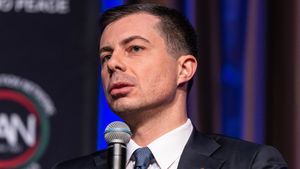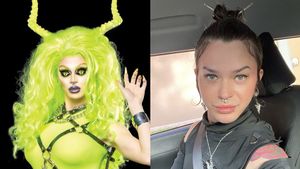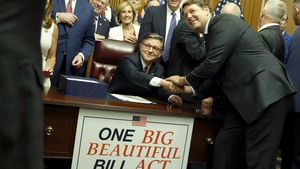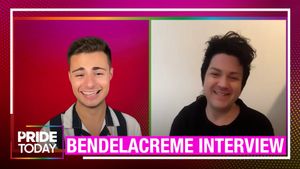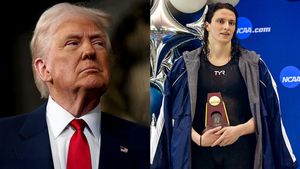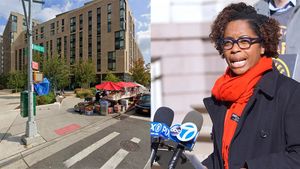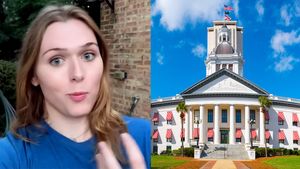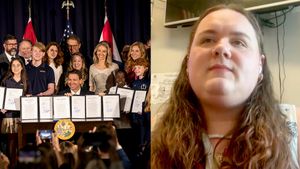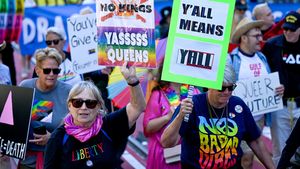Stephen Cone may be the least eccentric person I have ever met. He's youthful, nerdy, and utterly inconspicuous-- hardly the type anyone would pick out of a crowd and call an auteur. Yet, in the span of a decade, he's become one of Hollywood's most prolific queer filmmakers. Cone's already directed eight feature films, including the 2015 sleeper-hit Henry Gamble's Birthday Party, and, with his new film Princess Cyd, he's become a festival darling.
When we met at the Museum of the Moving Image in Queens in November, he greeted me in the lobby in a plain brown suit with a few days of beard growth and a welcoming smile, before immediately apologizing as he asked me to to give him a moment while he waited for a screen in the museum lobby to change so he could could snap a picture of an event poster for a screening of his work, all so he could show his family, he explained.
That's exactly what you can expect from Cone: unbridled enthusiasm for small things and little moments; a cool head; and genuine thoughtfulness. In his film career, he's become known for showcasing nuanced and intimate portrayals of queer people of faith, women, and adolescence, without ever becoming ham-fisted or ending up as a punchline.
After enthusing for a moment about the museum's incredible (and now permanent) Jim Henson exhibition, we sat down to talk about what inspired Princess Cyd and where he wants to take his work in the future.
OUT: What inspired you to write Princess Cyd?
Stephen Cone: I had this story in the back of my head in a different form for two or three years and it was entirely--do you know the author Marilynne Robinson? She wrote Housekeeping and she wrote the Gilead trilogy. She's mostly known for her books of essays and she did a two-part interview with Barack Obama when he was in office. Anyway, [she's] a prominent literary icon. She inspires me to no end. I could talk for two hours about why, but I won't do that.
Anyway, she's is 70 years old, has been divorced for many years, has fully grown children, and as far as I can tell is totally happy just living in her house in Iowa, teaching writing; reading literature; being obsessed with reading history and theology; and linking herself back to Melville and Emerson and all of these people. I thought it would be a cool character study if she suddenly got stuck with this completely opposite, feisty, horny, physically-driven young niece. What would the dynamic be in the house of a woman who lives a largely platonic, sexless life, and this other, very physically vibrant person?
When I originally conceived the idea for this movie, it was a darker mood piece, but then last year--this is very convoluted. Last year, I spent the first six months trying to make another movie that was going to be my first big film, and around the end of June, I was like, 'what are you doing? You're trying to rush this, the script's not ready, let's push this into the future and make this later.'
Then, rather than making the reasonable decision to enjoy the rest of my summer, I decided to make another movie entirely. I didn't want to make another movie just to make another movie because that's irresponsible, actually. It has to be a step forward--it has to feel like this is something that can be better or does something differently than what I have done before. Then I thought, 'Oh, I could transfer this story to Chicago.' Chicago was so beautiful that summer so the tone changed immediately--it became this celebratory, community-based love letter.
It sounds like this was produced on a time crunch!
Yeah, I started to think about pushing the other project at the end of June. I wrote this in mid-June, we started shooting in August and we wrapped at the end of September. And we had a cut by October 15th. Three and a half months from start to finish. Like I said, I don't want it to seem like I thought it was automatically going to be good. Sometimes when you quickly put something together, it's just not successful. But this wasn't like Henry Gamble where I was trying to juggle a whole bunch of strands at once. This was just two people, kind of talking, working out their issues. It came together.
Would you identify yourself as a queer filmmaker?
Well, I am a queer person. Am I a queer filmmaker? I wouldn't say that, but I don't object to people saying that about me. I was very much inspired by Gregg Araki in high school, and by discovering films like Edge of Seventeen and Beautiful Thing--even watching The Celluloid Closet or discovering Mala Noche and My Own Private Idaho. It's all fuel. I've always joked that even my queer films are only like 47% gay. They're gay for twenty minutes and then they're not gay for twenty-one minutes.
One of my heroes is French filmmaker Andre Techine and they seem to not have these categories overseas--it seems to be a quintessentially American thing to have "LGBT cinema." In Europe, and especially in Andre Techine's films, you never know whose desire will be fluid. There are like three bisexual characters in every one of his films. I love that. It's so integrated into the texture and the tapestry of life and there's queerness and there's normalcy and there's everything else in one big, exhilarating mix. That's what I aspire to: just integrating it all seamlessly.

Photo courtesy of Wolfe Video.
How did you thread a queer undercurrent into Princess Cyd?
Malic White, the actor playing Katie, is non-binary, and when I talked to them I told them, 'essentially I'm giving you, Malic, permission to rewind to a year or two before you fully acknowledged your identity as a non-binary person.' Katie is a girl in the film, but cut to two years later, I imagine they will have found themselves.
The Wise Kids and Princess Cyd have been largely described as "queer films", but the queerness was not originally a part of the conception. The Wise Kids started out as two young friends, one losing her faith and the other holding on violently to her faith. And then I thought, 'who else goes to this church? Let's give them a gay friend who wants to remain a Christian.' And then I thought, 'can I use this same movie to talk about closeted ministers? Why not? Let's just do it!' A lot of my movies have accidentally become ensemble films because I'm just indecisive and want to tell everyone's stories. For better or worse, I've carved out a niche for myself by doing that.
With Princess Cyd, obviously it started with Cyd and Miranda, and originally I thought maybe she meets a strapping young fellow. But then I thought, it's called Princess Cyd, but my princess isn't very princess-like. Maybe my un-princess-like princess could have an un-prince-like prince. And then I was like, how about a handsome girl? It's interesting to me--and I don't even know what it means--that queerness has crept into my films like a thief in the night.
Your films often include nuanced portrayals of characters of faith. What is your own relationship with religion?
My dad was a Baptist minister. My film The Wise Kids is very autobiographical. It's three kids in the bible belt, basically struggling to graduate from high school in conservative South Carolina. There's a preacher's daughter who's losing her faith, a male friend who's gay... I play a closeted minister. Late high school, early college, I just went through that thing of doing research on the historical validity of religion. It wasn't from any sort of traumatized background, but it was me starting to see through it a little bit, so I just stopped believing it.
It's important to me to represent people of faith in a really honest way, because I don't see that a lot in films with queer characters. It's always the bad guys against the good guys. For the first few years after I graduated from college, I was a more annoying, staunch atheist, and actually, largely due to Marilynne Robinson's influence on me, I've come back around to not being religious myself, but learning to love religion again and not be so hard on it. Even though prayer has been kind of politicized and everyone snarks about it on Twitter, when it's really a person earnestly trying to connect with something bigger than themselves, I think that prayer can be kind of beautiful. I say that as someone who doesn't pray.
There's nothing more annoying than hearing a prayer in a film that doesn't sound like a real prayer, but like it was written by a screenwriter who lived next door to Christians and imagined that this must be what prayer sounds like. That's important to me. It's similar to sexuality for me, with bisexuality, fluidity, gay people, lesbians, or non-binary people. In the same way that I would like to weave these threads into my films so seamlessly that they don't even stand out to people, I would like to do the same for people of faith.
What philosophy guides you most as a filmmaker?
It's about building a community. I mean, Cyd is about community. Moviemaking is about community. It's all vibe and trust. I've switched up certain positions over the years, but for the most part, I've gathered people who I love, and they love me and they love working on films. If there's a lack of judgement and everyone respects everyone, then you hang on to them. I can go to people I trust and who trust me and be like, let's go on another adventure together, and we all gather.
Talk About the Passion: Stephen Cone's First Act ran November 3-12, 2017 at the Museum of the Moving Image. Princess Cyd is now screening in New York and Los Angeles, available to stream on various digital on-demand platforms, and available on DVD from Wolfe Video.



























